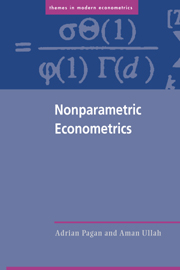Book contents
- Frontmatter
- Contents
- Preface
- 1 Introduction
- 2 Methods of Density Estimation
- 3 Conditional Moment Estimation
- 4 Nonparametric Estimation of Derivatives
- 5 Semiparametric Estimation of Single-Equation Models
- 6 Semiparametric and Nonparametric Estimation of Simultaneous Equation Models
- 7 Semiparametric Estimation of Discrete Choice Models
- 8 Semiparametric Estimation of Selectivity Models
- 9 Semiparametric Estimation of Censored Regression Models
- 10 Retrospect and Prospect
- A Statistical Methods
- References
- Index
7 - Semiparametric Estimation of Discrete Choice Models
Published online by Cambridge University Press: 03 December 2009
- Frontmatter
- Contents
- Preface
- 1 Introduction
- 2 Methods of Density Estimation
- 3 Conditional Moment Estimation
- 4 Nonparametric Estimation of Derivatives
- 5 Semiparametric Estimation of Single-Equation Models
- 6 Semiparametric and Nonparametric Estimation of Simultaneous Equation Models
- 7 Semiparametric Estimation of Discrete Choice Models
- 8 Semiparametric Estimation of Selectivity Models
- 9 Semiparametric Estimation of Censored Regression Models
- 10 Retrospect and Prospect
- A Statistical Methods
- References
- Index
Summary
Introduction
In many data sets occurring in the social sciences the object of interest is whether a decision has been made or an action carried out. Examples would be whether a durable good is purchased, a bond is issued, or, perhaps, whether a corporation removes its CEO. Generally, an investigator is interested in what it is that precipitates the decision or action, and a range of possible influences (xi) is entertained. What makes this different from a regular regression problem is that the variable to be explained (yi) is qualitative rather than quantitative; or, treating the decision outcome as a random variable taking the value zero or unity (reflecting negative and positive decisions or actions), yi must be a discrete rather than a continuous random variable.
An enormous literature has built up on the types of models that can be employed to explain such data, a masterly exposition of which is Amemiya (1981). Economists imported many of these models from medical and biological statistics, and the traditional ways of estimating unknown parameters have revolved around formulating a suitable density function for the observed data. Section 7.2 reviews this literature, pointing to the fact that estimation has proceeded in either one of two ways. In the first, the discrete nature of the random variable enables one to formulate relationships as a heteroskedastic nonlinear regression. In the second, maximum likelihood methods are employed.
Information
- Type
- Chapter
- Information
- Nonparametric Econometrics , pp. 272 - 299Publisher: Cambridge University PressPrint publication year: 1999
